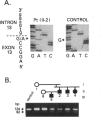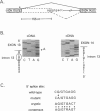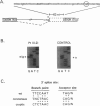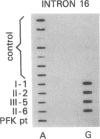Abstract
Phosphofructokinase (PFK) plays a major role in glycolysis. Human PFK is composed of three isoenzyme subunits (muscle [Ml, liver [L], and platelet [P]), which are encoded by different genes. Deficiency of muscle isoenzyme (PFK-M), glycogenosis type VII (Tarui disease), is an autosomal recessive disorder characterized by an exertional myopathy and hemolytic syndrome. Several disease-causing mutations have been identified in the PFK-M gene in Japanese, Ashkenazi Jewish, Italian, French Canadian, and Swiss patients. We describe the genetic defect in a Swedish family with affected individuals in two generations. The patients are compound heterozygotes: two different mutations result in retention of intron 13 or intron 16 sequences into mRNA. A G1127A transition destroys the 5' donor site of intron 13, resulting in a 155-nt retention of the intronic sequence. An a-to-g base change in intron 16 creates a new acceptor splice site, resulting in a 63-nt retention of intronic sequence. Both mutations are predicted to result in premature termination of translation. Some of the transcripts generated from the intron 16 mutated allele also contain intron 10 sequence unspliced.
Full text
PDF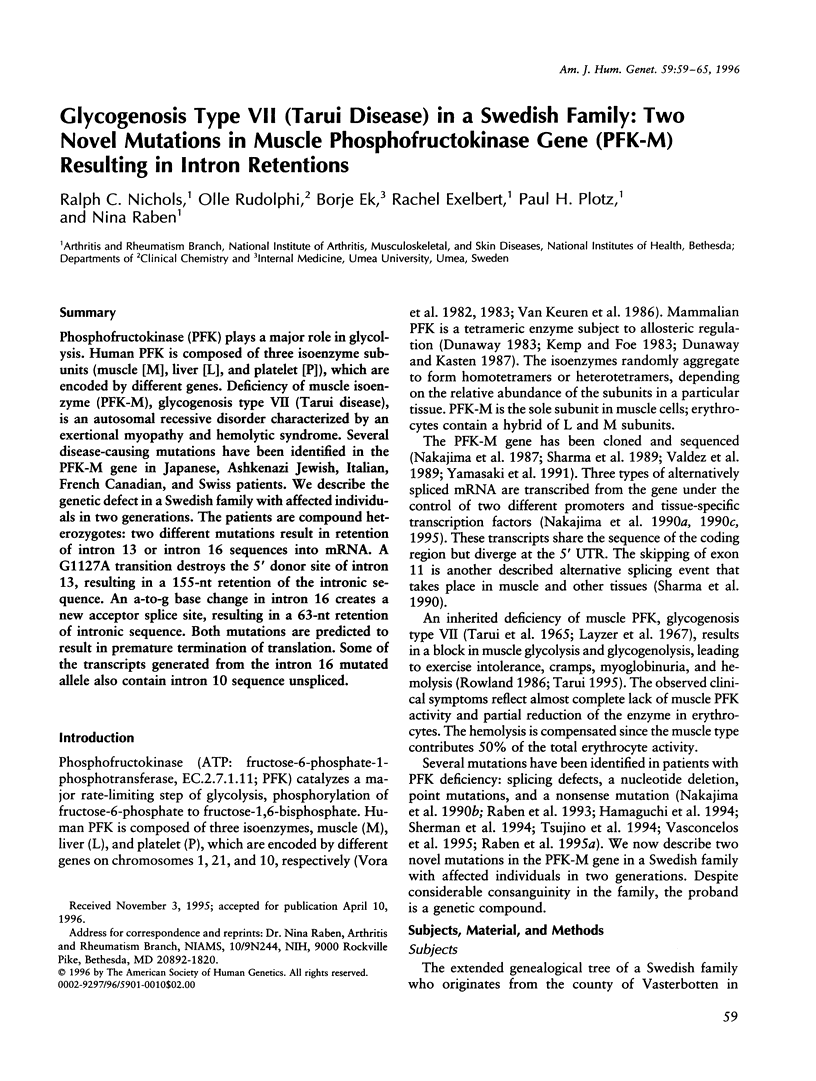
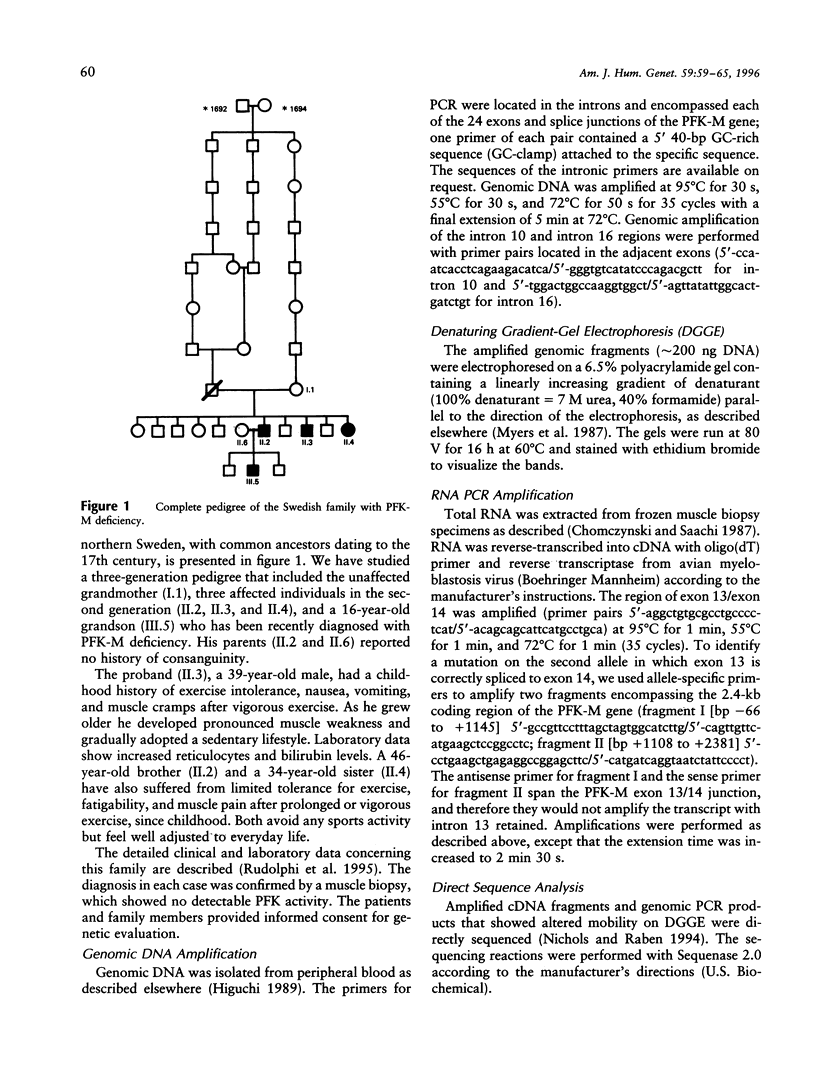
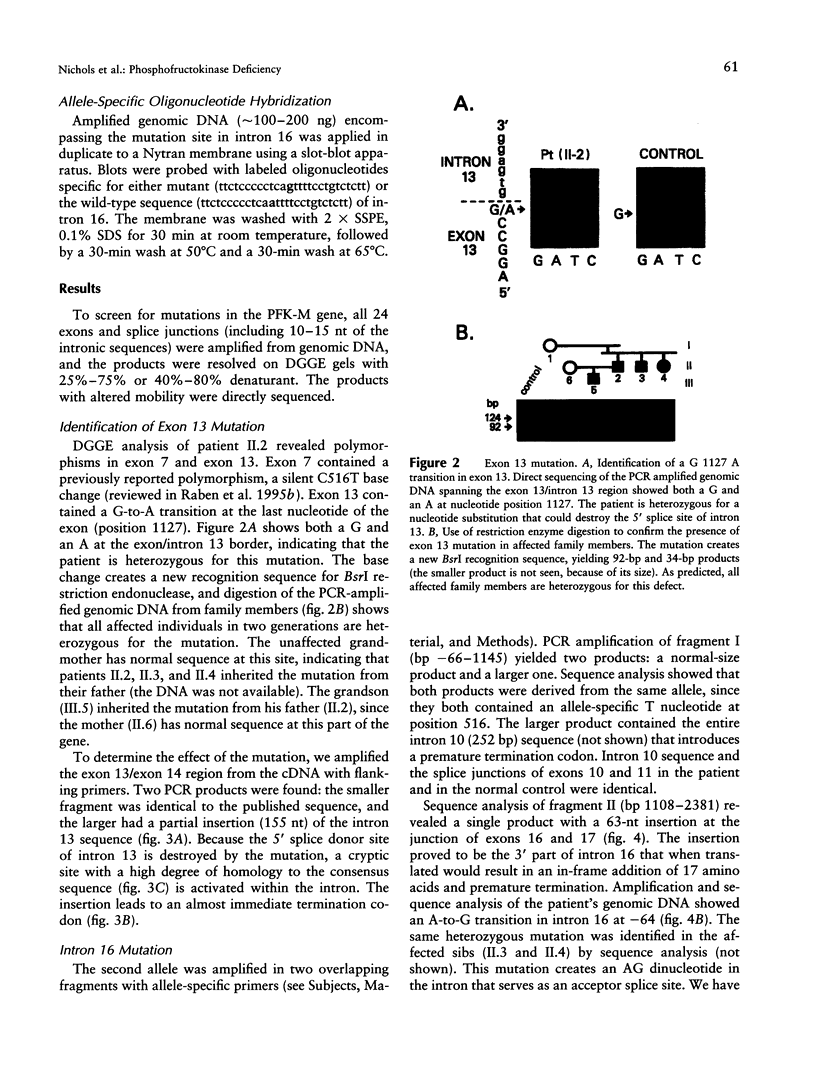
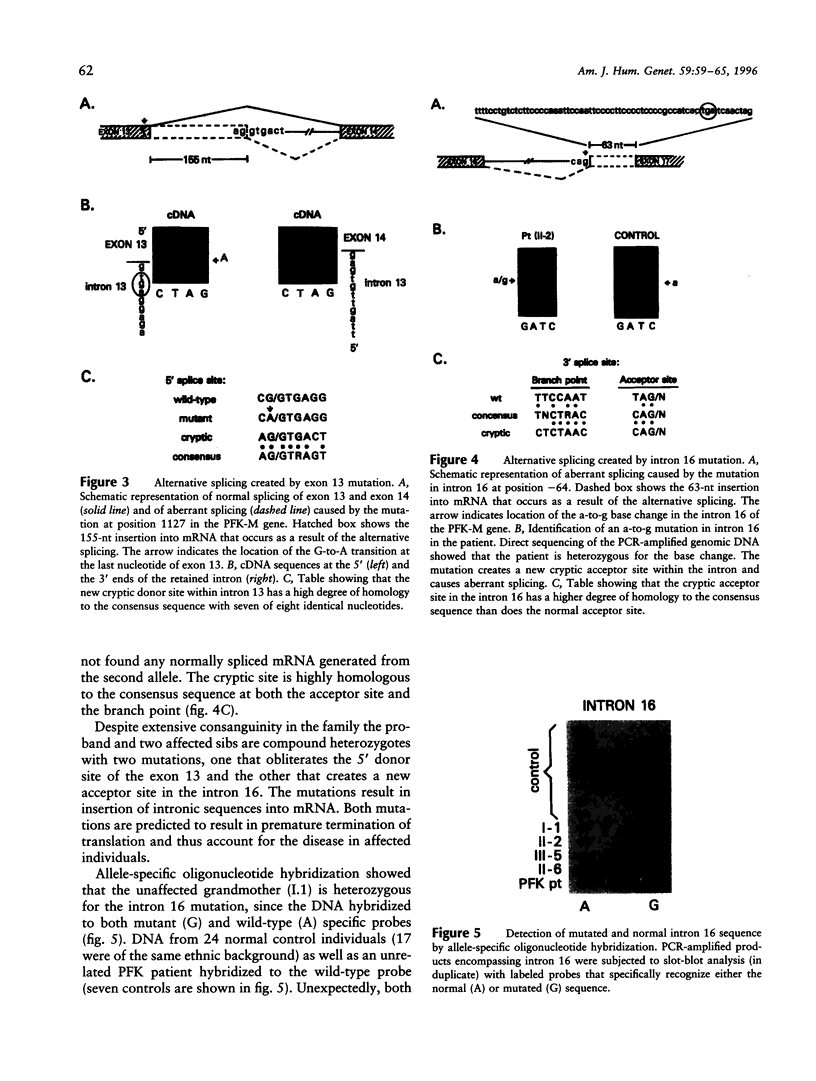
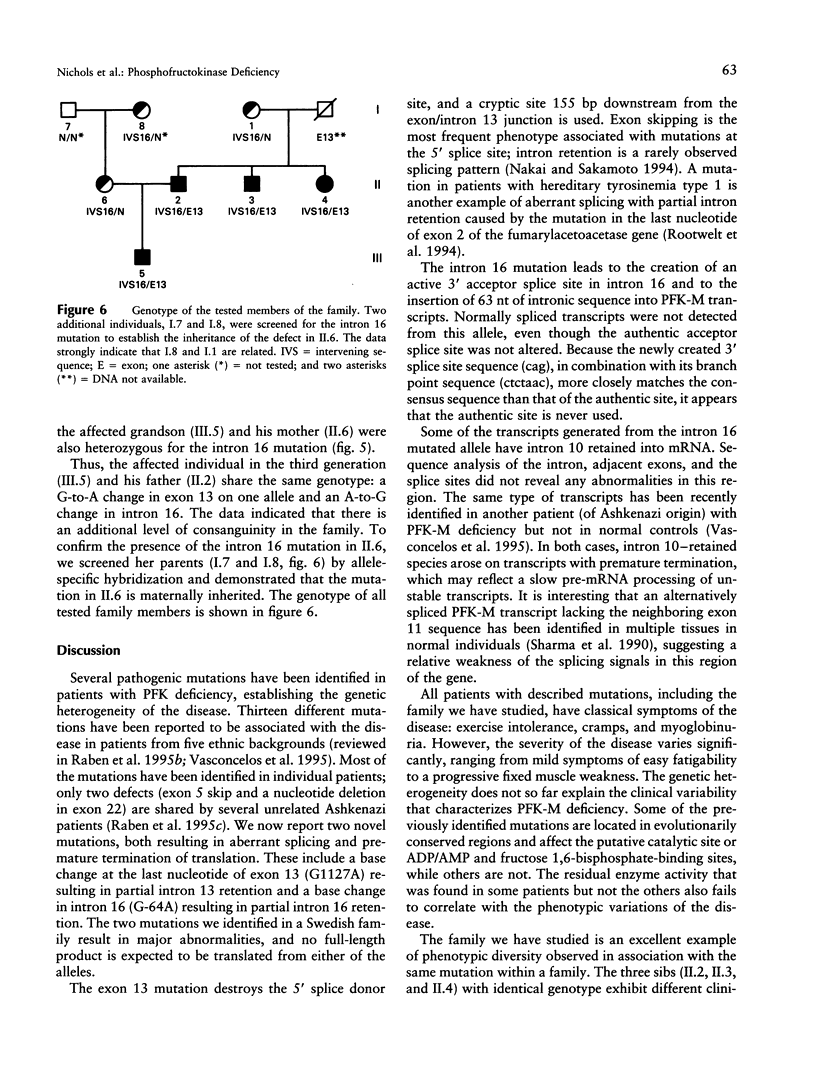
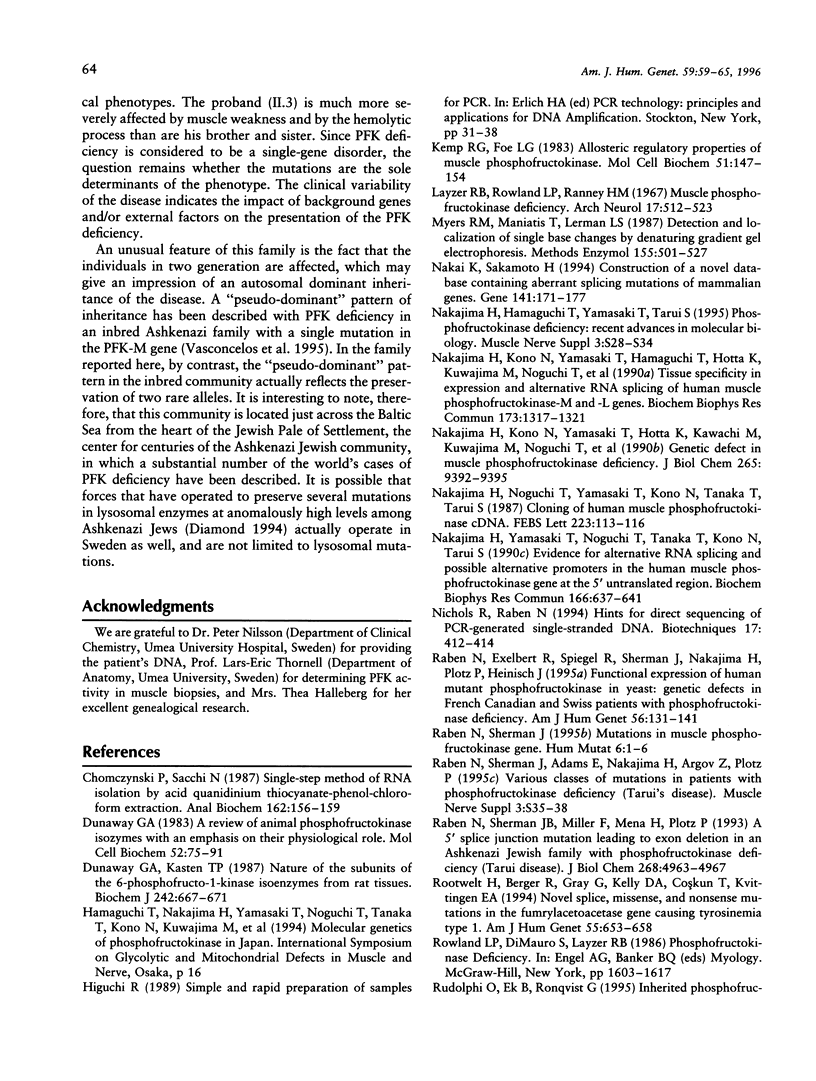
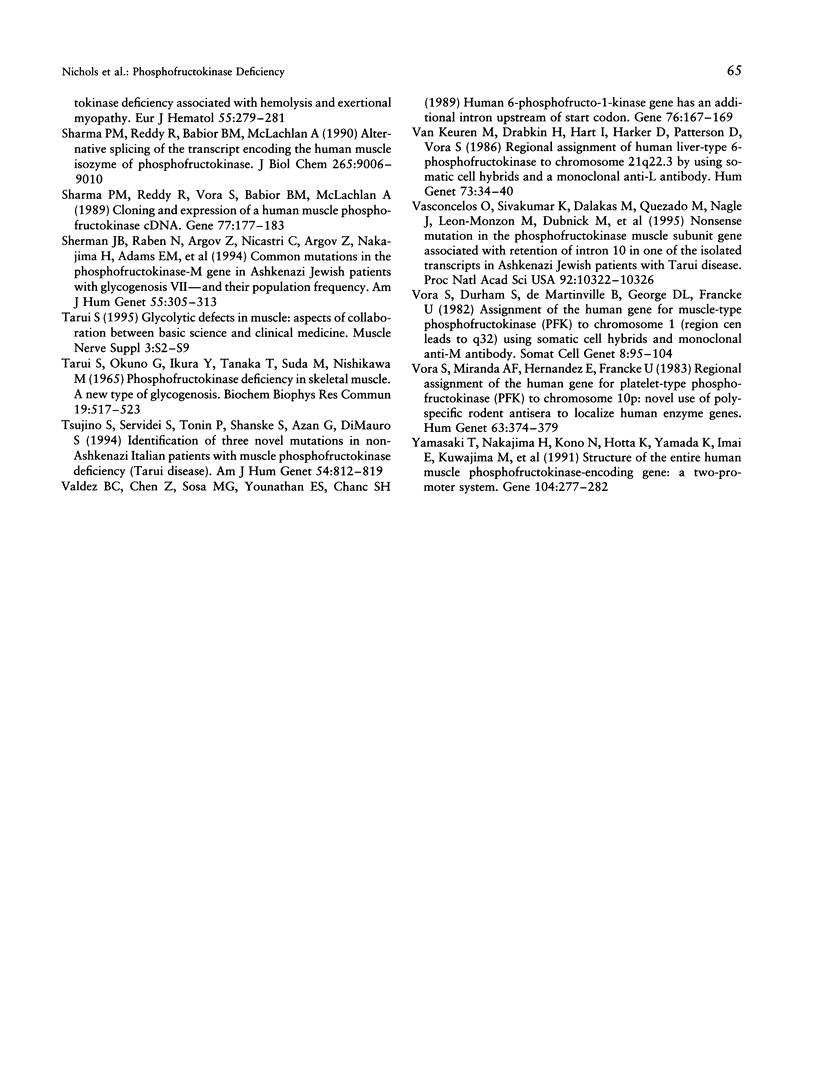
Images in this article
Selected References
These references are in PubMed. This may not be the complete list of references from this article.
- Chomczynski P., Sacchi N. Single-step method of RNA isolation by acid guanidinium thiocyanate-phenol-chloroform extraction. Anal Biochem. 1987 Apr;162(1):156–159. doi: 10.1006/abio.1987.9999. [DOI] [PubMed] [Google Scholar]
- Dunaway G. A. A review of animal phosphofructokinase isozymes with an emphasis on their physiological role. Mol Cell Biochem. 1983;52(1):75–91. doi: 10.1007/BF00230589. [DOI] [PubMed] [Google Scholar]
- Dunaway G. A., Kasten T. P. Nature of the subunits of the 6-phosphofructo-1-kinase isoenzymes from rat tissues. Biochem J. 1987 Mar 15;242(3):667–671. doi: 10.1042/bj2420667. [DOI] [PMC free article] [PubMed] [Google Scholar]
- Kemp R. G., Foe L. G. Allosteric regulatory properties of muscle phosphofructokinase. Mol Cell Biochem. 1983;57(2):147–154. doi: 10.1007/BF00849191. [DOI] [PubMed] [Google Scholar]
- Layzer R. B., Rowland L. P., Ranney H. M. Muscle phosphofructokinase deficiency. Arch Neurol. 1967 Nov;17(5):512–523. doi: 10.1001/archneur.1967.00470290066009. [DOI] [PubMed] [Google Scholar]
- Myers R. M., Maniatis T., Lerman L. S. Detection and localization of single base changes by denaturing gradient gel electrophoresis. Methods Enzymol. 1987;155:501–527. doi: 10.1016/0076-6879(87)55033-9. [DOI] [PubMed] [Google Scholar]
- Nakai K., Sakamoto H. Construction of a novel database containing aberrant splicing mutations of mammalian genes. Gene. 1994 Apr 20;141(2):171–177. doi: 10.1016/0378-1119(94)90567-3. [DOI] [PubMed] [Google Scholar]
- Nakajima H., Hamaguchi T., Yamasaki T., Tarui S. Phosphofructokinase deficiency: recent advances in molecular biology. Muscle Nerve Suppl. 1995;3:S28–S34. doi: 10.1002/mus.880181408. [DOI] [PubMed] [Google Scholar]
- Nakajima H., Kono N., Yamasaki T., Hamaguchi T., Hotta K., Kuwajima M., Noguchi T., Tanaka T., Tarui S. Tissue specificity in expression and alternative RNA splicing of human phosphofructokinase-M and -L genes. Biochem Biophys Res Commun. 1990 Dec 31;173(3):1317–1321. doi: 10.1016/s0006-291x(05)80931-3. [DOI] [PubMed] [Google Scholar]
- Nakajima H., Kono N., Yamasaki T., Hotta K., Kawachi M., Kuwajima M., Noguchi T., Tanaka T., Tarui S. Genetic defect in muscle phosphofructokinase deficiency. Abnormal splicing of the muscle phosphofructokinase gene due to a point mutation at the 5'-splice site. J Biol Chem. 1990 Jun 5;265(16):9392–9395. [PubMed] [Google Scholar]
- Nakajima H., Noguchi T., Yamasaki T., Kono N., Tanaka T., Tarui S. Cloning of human muscle phosphofructokinase cDNA. FEBS Lett. 1987 Oct 19;223(1):113–116. doi: 10.1016/0014-5793(87)80519-7. [DOI] [PubMed] [Google Scholar]
- Nakajima H., Yamasaki T., Noguchi T., Tanaka T., Kono N., Tarui S. Evidence for alternative RNA splicing and possible alternative promoters in the human muscle phosphofructokinase gene at the 5' untranslated region. Biochem Biophys Res Commun. 1990 Jan 30;166(2):637–641. doi: 10.1016/0006-291x(90)90856-i. [DOI] [PubMed] [Google Scholar]
- Nichols R. C., Raben N. Hints for direct sequencing of PCR-generated single-stranded DNA. Biotechniques. 1994 Sep;17(3):412–414. [PubMed] [Google Scholar]
- Raben N., Exelbert R., Spiegel R., Sherman J. B., Nakajima H., Plotz P., Heinisch J. Functional expression of human mutant phosphofructokinase in yeast: genetic defects in French Canadian and Swiss patients with phosphofructokinase deficiency. Am J Hum Genet. 1995 Jan;56(1):131–141. [PMC free article] [PubMed] [Google Scholar]
- Raben N., Sherman J. B. Mutations in muscle phosphofructokinase gene. Hum Mutat. 1995;6(1):1–6. doi: 10.1002/humu.1380060102. [DOI] [PubMed] [Google Scholar]
- Raben N., Sherman J., Miller F., Mena H., Plotz P. A 5' splice junction mutation leading to exon deletion in an Ashkenazic Jewish family with phosphofructokinase deficiency (Tarui disease). J Biol Chem. 1993 Mar 5;268(7):4963–4967. [PubMed] [Google Scholar]
- Rootwelt H., Berger R., Gray G., Kelly D. A., Coşkun T., Kvittingen E. A. Novel splice, missense, and nonsense mutations in the fumarylacetoacetase gene causing tyrosinemia type 1. Am J Hum Genet. 1994 Oct;55(4):653–658. [PMC free article] [PubMed] [Google Scholar]
- Rudolphi O., Ek B., Ronquist G. Inherited phosphofructokinase deficiency associated with hemolysis and exertional myopathy. Eur J Haematol. 1995 Oct;55(4):279–281. doi: 10.1111/j.1600-0609.1995.tb00278.x. [DOI] [PubMed] [Google Scholar]
- Sharma P. M., Reddy G. R., Babior B. M., McLachlan A. Alternative splicing of the transcript encoding the human muscle isoenzyme of phosphofructokinase. J Biol Chem. 1990 Jun 5;265(16):9006–9010. [PubMed] [Google Scholar]
- Sharma P. M., Reddy G. R., Vora S., Babior B. M., McLachlan A. Cloning and expression of a human muscle phosphofructokinase cDNA. Gene. 1989 Apr 15;77(1):177–183. doi: 10.1016/0378-1119(89)90372-7. [DOI] [PubMed] [Google Scholar]
- Sherman J. B., Raben N., Nicastri C., Argov Z., Nakajima H., Adams E. M., Eng C. M., Cowan T. M., Plotz P. H. Common mutations in the phosphofructokinase-M gene in Ashkenazi Jewish patients with glycogenesis VII--and their population frequency. Am J Hum Genet. 1994 Aug;55(2):305–313. [PMC free article] [PubMed] [Google Scholar]
- TARUI S., OKUNO G., IKURA Y., TANAKA T., SUDA M., NISHIKAWA M. PHOSPHOFRUCTOKINASE DEFICIENCY IN SKELETAL MUSCLE. A NEW TYPE OF GLYCOGENOSIS. Biochem Biophys Res Commun. 1965 May 3;19:517–523. doi: 10.1016/0006-291x(65)90156-7. [DOI] [PubMed] [Google Scholar]
- Tarui S. Glycolytic defects in muscle: aspects of collaboration between basic science and clinical medicine. Muscle Nerve Suppl. 1995;3:S2–S9. doi: 10.1002/mus.880181404. [DOI] [PubMed] [Google Scholar]
- Tsujino S., Servidei S., Tonin P., Shanske S., Azan G., DiMauro S. Identification of three novel mutations in non-Ashkenazi Italian patients with muscle phosphofructokinase deficiency. Am J Hum Genet. 1994 May;54(5):812–819. [PMC free article] [PubMed] [Google Scholar]
- Valdez B. C., Chen Z., Sosa M. G., Younathan E. S., Chang S. H. Human 6-phosphofructo-1-kinase gene has an additional intron upstream of start codon. Gene. 1989 Mar 15;76(1):167–169. doi: 10.1016/0378-1119(89)90019-x. [DOI] [PubMed] [Google Scholar]
- Van Keuren M., Drabkin H., Hart I., Harker D., Patterson D., Vora S. Regional assignment of human liver-type 6-phosphofructokinase to chromosome 21q22.3 by using somatic cell hybrids and a monoclonal anti-L antibody. Hum Genet. 1986 Sep;74(1):34–40. doi: 10.1007/BF00278782. [DOI] [PubMed] [Google Scholar]
- Vasconcelos O., Sivakumar K., Dalakas M. C., Quezado M., Nagle J., Leon-Monzon M., Dubnick M., Gajdusek D. C., Goldfarb L. G. Nonsense mutation in the phosphofructokinase muscle subunit gene associated with retention of intron 10 in one of the isolated transcripts in Ashkenazi Jewish patients with Tarui disease. Proc Natl Acad Sci U S A. 1995 Oct 24;92(22):10322–10326. doi: 10.1073/pnas.92.22.10322. [DOI] [PMC free article] [PubMed] [Google Scholar]
- Vora S., Durham S., de Martinville B., George D. L., Francke U. Assignment of the human gene for muscle-type phosphofructokinase (PFKM) to chromosome 1 (region cen leads to q32) using somatic cell hybrids and monoclonal anti-M antibody. Somatic Cell Genet. 1982 Jan;8(1):95–104. doi: 10.1007/BF01538653. [DOI] [PubMed] [Google Scholar]
- Vora S., Miranda A. F., Hernandez E., Francke U. Regional assignment of the human gene for platelet-type phosphofructokinase (PFKP) to chromosome 10p: novel use of polyspecific rodent antisera to localize human enzyme genes. Hum Genet. 1983;63(4):374–379. doi: 10.1007/BF00274765. [DOI] [PubMed] [Google Scholar]
- Yamasaki T., Nakajima H., Kono N., Hotta K., Yamada K., Imai E., Kuwajima M., Noguchi T., Tanaka T., Tarui S. Structure of the entire human muscle phosphofructokinase-encoding gene: a two-promoter system. Gene. 1991 Aug 15;104(2):277–282. doi: 10.1016/0378-1119(91)90262-a. [DOI] [PubMed] [Google Scholar]



